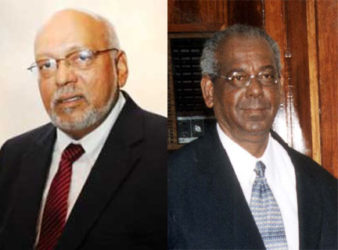Former President Donald Ramotar says the PPP’s support of term limits has not changed and head of the 1999-2000 constitutional commission, Ralph Ramkarran says that if necessary a referendum on the matter should pass easily as both major parties support limits on presidential terms.
“If the Attorney General does not succeed in the CCJ, the Government will have to do what it needs to – hold a referendum. The PPP would have no reason not to support it,” Ramkarran said in his column in yesterday’s Sunday Stabroek.
Pointing to Ramkarran’s column, Ramotar stated that while he is not sure what the current position of the PPP will be on a referendum, the party’s position on having a term limit has not changed.
“It is true all that Ralph is saying in his article (yesterday) as far as the PPP’s position and support for a two term limit for presidents…I had worked with Ralph on this matter. I can’t remember the exact year but there was a time when billboards were being put up supporting a third term…I had condemned them because it was not in keeping with the party’s position on the matter…,” Ramotar asserted.

“As far as I am aware, the PPP still holds true to these views and you must remember that it was not the PPP that was a party in this court matter so the focus should not be on the party. This was a private citizen. (Former President) Bharrat (Jagdeo) was the President when the changes (to the constitution introducing term limits) were made and he signed to them and that in itself showed that it was consistent with the party’s position…so nothing has changed,” he added.
Justice Ian Chang’s ruling in July 2015 – that the presidential term limit was not lawful as the constitutional change was not achieved via referendum- was based on a constitutional motion brought by private citizen Cedrick Richardson, who challenged the restriction created by amendments to Article 90 that were enacted in 2001 after the bipartisan constitution reform process.
Attorney-General Basil Williams and the then Speaker of the National Assembly Raphael Trotman were named as the defendants in that case. Following Justice Chang’s ruling, both defendants filed appeals.
By a split decision, the Guyana Court of Appeal on Wednesday upheld Justice Chang’s decision and the Attorney General has since signalled that the case will be taken to the Caribbean Court of Justice.
Following amendments, Article 90 of the Constitution states at Clause 2(a) that a person elected as president after the year 2000 “is eligible for re-election only once” and at Clause (3) that a person who acceded to the presidency after the year 2000 and served therein on a single occasion for not less than such period as may be determined by the National Assembly “is eligible for election as president only once.”
Richardson claimed that Act No 17 of 2001, which was passed by a two-thirds majority of all elected members of the National Assembly to enable the term-limits, “unconstitutionally curtails and restricts” his sovereign and democratic rights and freedom as a qualified elector “to elect the person of former president Bharrat Jagdeo” as executive president.
Leader of the Opposition and twice-elected President, Jagdeo yesterday told Stabroek News that he will wait until today to discuss his and the party’s view on the matter, at the PPP’s weekly press conference.
The former President had repeatedly distanced himself from the case and had publicly said that he had no intention of running for office again.
Before both the 2011 and 2015 General and Regional Elections Jagdeo had echoed his stance of not wanting any government office bearing status but that he would use his clout to galvanize support for then presidential candidate Ramotar.
However, he made an about face when Ramotar lost the 2015 elections and became Opposition Leader after assuring that while his name was on the party’s list of candidates, he would not be seeking any parliamentary positions.
Following the PPP’s congress last December, he was elected as General Secretary of the party.
Ramkarran explained that back in 1994/5, the PPP had unanimously decided to propose to the then Select Committee on Constitutional Reform that a president should only serve two terms. He said that he led the delegation which included Ramotar and presented the PPP’s position.
“The PPP presented the same position to the Constitutional Reform Commission (1999-2000), which I chaired. Its delegation was led by former President Donald Ramotar, then General Secretary. The two-term presidential limit, supported by the PNCR, was adopted by the Constitution Reform Commission and formed part of its recommendations. Article 90(3) of the Constitution was duly amended by Act No. 17 of 2001, unanimously passed in the National Assembly, to limit the presidential terms to two.”
Pointing out that the Guyana Constitution can be amended in three ways; that some provisions require a simple majority, some a two-third majority and others, a referendum he stated that an amendment to Article 90 requires a two-third majority.
Ramkarran said that in the Richardson Third Term Case, which was upheld by the Court of Appeal last week, then Chief Justice Chang held that limiting the presidential term to two was not an amendment to Article 90 but a new provision of the Constitution. It was on that basis, Act No. 17 of 2001, which limited the right of the electorate was deemed by Justice Chang to require not a two-thirds majority but a referendum.
Ramkarran said that if the CCJ upholds the decision of the Court of Appeal, in political terms, “the issue becomes only of expensive inconvenience, namely, the holding of a referendum.”
The Senior Counsel and former longstanding executive of the PPP believes that since both the PPP and the PNCR support a two-term presidential limit, coupled with the fact that Jagdeo has repeatedly said that he also does and has no interest in a third term, the outcome of a referendum would be a mere formality.
He said that the present leadership of the PPP would be expected to resist internal calls to change its longstanding position in support of term limits and rationalized that unlimited right to hold the position of head of government has the propensity to lead to authoritarian leaders and corruption.
“The unlimited right to hold the position of head of government will inevitably lead to authoritarianism and corruption. Wise leaders like Cheddi Jagan, Janet Jagan and Desmond Hoyte saw this and that is why they supported term limits. Both main political parties should, therefore, have no difficulty in supporting a referendum.
“If the Attorney General does not succeed in the CCJ, the Government will have to do what it needs to – hold a referendum. The PPP would have no reason not to support it”, Ramkarran asserted, while advising that government could have the constitutional amendment process completed in time to piggyback off of the 2019 Local Government Elections and have all other requisite issues on the referendum at the same time so as to save money and other resources.
A number of Jagdeo’s supporters have openly tried to promote him for a third term and analysts say there still be could be efforts made at the recently elected Central Committee for a change in the party’s position.
For Ramotar, he does not think that the party’s members would agree for a change in their longstanding policy on the matter but is not sure on the referendum; a move he believes could see party supporters voting in favour of the third term.
“If there is a referendum at this time it would be anyone’s guess as to the outcome, but I think that given the current state of affairs and how persons are aggrieved with the current government, people would very much vote in favour of having no limits because they will see it as a decision in getting Jagdeo to run again for a third term,” he posited.
“It is very ticklish so people might not look at the bigger picture as for what it means for the future…,” he added.









